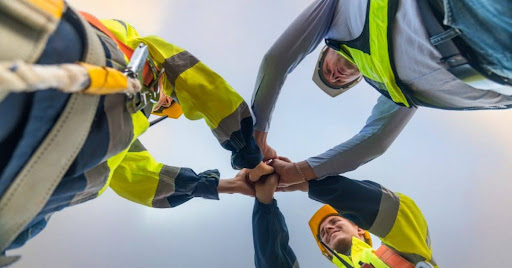
Travel in the construction industry is essential for on-site supervision, project inspections, and collaboration. It ensures managers, engineers, and stakeholders can monitor progress, address issues promptly, and maintain quality and safety standards.
Frequent travel enables face-to-face coordination with teams, clients, and subcontractors, helping avoid delays and miscommunication. It also allows for site assessments, equipment checks, and compliance with local regulations. By being present on-site, decision-makers can make real-time adjustments, ensuring smooth project execution and timely delivery.
However, managing construction industry travel in this sector presents unique challenges. Companies must ensure their teams travel smoothly and stay safe while on the move. That’s why service, safety, and support are the key priorities.
In this blog, we will explore how these three priorities shape travel strategies for construction businesses. We’ll also dive into best practices that companies can adopt to enhance their travel programs.
Essential Aspects of Construction Industry Travel
1. Service: Delivering Seamless Travel Management
Smooth travel ensures employees reach job sites on time. Efficient travel arrangements also reduce stress and boost productivity. Here’s how service impacts construction travel:
- Coordinating multiple booking : Construction teams often travel in groups. They need flights, hotels, and ground transportation booked simultaneously. A centralized travel management platform simplifies this coordination.
- Fast travel approvals : Construction schedules can change quickly. Companies need a travel solution that offers quick approvals to avoid delays.
- 24/7 travel assistance : Crews travel to remote sites where problems can arise. Having 24/7 support for flight changes or emergencies ensures no one is stranded.
- Access to wide inventory : Employees often prefer booking through their preferred airlines or hotels. Construction industry travel platforms with extensive options improve employee satisfaction.
Efficient management of traveling construction ensures smooth operations. Providing high-quality service ensures construction teams stay focused on the job at hand. Any travel disruptions can cause project delays, leading to higher costs.
Best Practices for Service-Oriented Travel
- Use a travel management solution : This ensures flights and accommodations are booked using the same system for easy tracking.
- Establish clear travel policies : Employees need guidance on allowable travel expenses and booking preferences.
- Incentivize on-time bookings : Reward employees for early travel bookings to avoid last-minute costs.
- Automate expense reporting : Seamless service extends to fast reimbursement.
2. Safety: Keeping Travelers Protected on the Job
Safety is critical in construction travel. Workers may travel to high-risk areas, and companies must account for these risks. Providing safety guidelines and resources ensures peace of mind for travelers.
- Travel risk assessments : Companies must assess the risks associated with every destination. This includes checking local weather, political conditions, and health guidelines.
- Travel insurance for employees : Construction sites involve risks. Travel insurance with medical coverage and trip protection ensures employees receive care when needed.
- Health and safety protocols : Workers may need vaccines or other precautions, especially when traveling internationally. Keeping these updated is a must.
- Emergency alerts and support : Employees should receive real-time alerts about risks like extreme weather or transportation strikes.
A robust safety plan in construction industry travel reduces risks and ensures compliance with duty-of-care obligations. This is particularly important because construction companies are legally and morally responsible for protecting traveling employees.
Best Practices for Safety
- Offer travel insurance : Ensure policies cover medical expenses, trip cancellations, and accidents on-site.
- Monitor travel risks continuously : Use travel management platforms that offer real-time risk updates.
- Maintain communication channels : Employees need a direct line to supervisors or travel managers during emergencies.
- Prepare emergency plans : Provide travelers with safety kits, including emergency contacts and medical resources.
3. Support: Ensuring Employees Feel Cared For
The nature of construction work is demanding. The success of traveling construction depends on seamless planning. Traveling employees need consistent support to stay motivated. Proper support also minimizes construction industry travel burnout and improves retention.
- Pre-trip support : Companies can help employees by offering tools to book travel quickly and access destination information.
- On-trip assistance : When delays or cancellations happen, employees need fast help with rebooking. Support can be provided through dedicated travel consultants or mobile apps.
- Mental health and well-being programs : Long work hours and frequent travel can be draining. Access to mental health services boosts morale and reduces stress.
- Post-trip feedback collection : Companies should ask employees for travel feedback to improve future experiences.
When employees feel supported, they are more engaged. This improves overall job satisfaction and ensures smoother project delivery.
Best Practices for Employee Support
- Provide mobile travel apps : These help employees stay updated with flight schedules, booking changes, and policy guidelines.
- Assign dedicated travel managers : A point of contact ensures employees feel supported during their journeys.
- Offer relaxation benefits : Companies can provide perks like lounge access or wellness packages for frequent travelers.
- Encourage feedback : Listening to travelers helps identify pain points and improve travel policies.
Why Construction Travel Needs Strong Priorities?
Managing traveling construction is about more than just getting people from point A to point B. It requires careful planning to meet the industry’s unique demands. Here’s how service, safety, and support come together:
- Service ensures smooth bookings and travel coordination, avoiding costly delays.
- Safety guarantees employees stay protected, even when traveling to risky locations.
- Support ensures workers feel valued, reducing stress and boosting productivity.
By prioritizing these three elements, companies can avoid project delays, lower travel risks, and improve employee satisfaction. A well-designed construction industry travel program enhances efficiency, allowing the workforce to focus on project goals.
Manage Traveling Construction With Ease
Service, safety, and support are the backbone of successful travel in the construction industry. When companies excel in these areas, they build trust with employees and ensure project timelines are met.
itilite travel management platform provides seamless service with automated approvals and expense tracking. Safety protocols, including travel insurance and emergency alerts, reduce risks. Lastly, offering continuous support keeps employees engaged and motivated throughout their journeys.
Construction industry travel companies create a resilient strategy by addressing these three priorities.
To know more about the benefits of itilite, book a free demo today!













